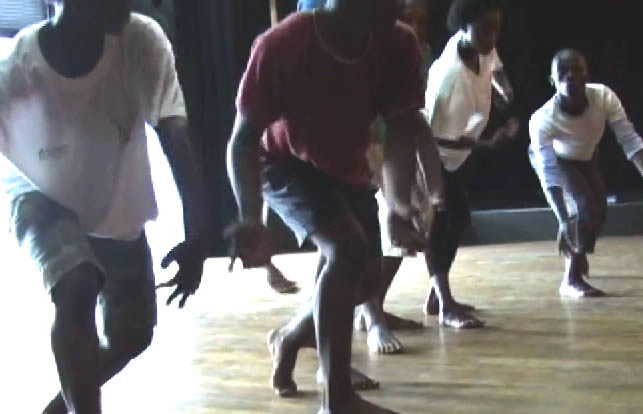Dance is a language – a body language – and one expressed through a number of tongues. Sometimes the meaning is obvious – nearly universal – while in other situations we need some translation to bring us closer to the artist's intention. When artists from different cultural backgrounds come together the encounter offers more than translation – it offers an exchange, one comprising new context, meaning, history, diversity and shared experience, innovation and a new journey to take.
Following on from work that I developed in various European countries, Singapore and New York, I have made five visits to the Eastern Cape of South Africa as a member of the cultural exchange programme with North East England. I got to know Port Elizabeth-based Uphondo Lwe Afrika, a dance and music ensemble performing mostly traditional and traditionally-inspired repertoire. They and I first worked together during the devising rehearsals for the production that became known as Elephant. This was being made by North East England theatre company Dodgy Clutch, which subsequently toured in South Africa, the UK, and dates in New York. Uphondo became increasingly interested in new ways of devising and developing ideas into choreography. We made an exchange: I introduced them to an imaginative workshop process where movement is generated into dance from any conceivable idea, topic, or situation; and with the company's director Zamuxolo Mgoduka I learned about his work as a sangoma, a Southern Africa traditional healer – working with individual illness, conflict resolution, and community cohesion – and how this informed the company's work in post-apartheid South Africa.
The work that I developed or collaborated on took place in and around the city centre and townships of Port Elizabeth, the largest trading seaport on the Indian Ocean side of South Africa, and then further into the more rural Tyhume Valley. With an Arts Council England travel bursary I devised a series of short choreographies entitled Bushes and Trees with members of Uphondo Lwe Afrika, including a duo with Zamuxolo, which the Port Elizabeth Opera House presented on its main stage. In the Tyhume Valley Dodgy Clutch had organised a series of schools workshops and performances, and musician and musicologist Pedro Espi-Sanchis and I developed workshops that integrated storytelling, instrument making and performance with the children in the fields around a number of small village schools. The children and I devised phrases of choreographed movement, while they developed them into elements of composition involving large and small circles, processional progression, and ensemble motifs.
Back in Port Elizabeth I was introduced by artist and educationist Michael Barry to the Nelson Mandela Metropolitan University and over a number of days a group of students introduced me to their campus where we devised and filmed a series of choreographed episodes that unfolded in different university locations.
During the time when these activities and events were developing, the cultural exchange programme – which became known as Swallows – would bring participants together to feedback, hear stories, review recent work and preview what was up-and-coming. These were invaluable in keeping in touch with other initiatives that focused and excited people differently. Similarly, here in the UK I organised and established a network of venues and schools that hosted Uphondo Lwe Afrika when the company visited North East England. In addition to workshops and performances, I facilitated discussion between company members and children in schools where we compared and contrasted our home and cultural life experiences.
In a broader context I am contributing to think tanks, facilitating open space discussion, and developing programmes of engagement as a trustee of Intercultural Arts in North East England. IcA works with arts, diversity and participation, and I have contributed to developing and delivering its current programme of regional forums and practice exchange events. The most recent of these I devised to take place on the Tyne and Wear metro – with key stopping-off places for site-specific creative activity and discussion. Often working with other arts facilitators, we have developed these activities to initiate and support arts practice that promotes equality and inclusivity.
